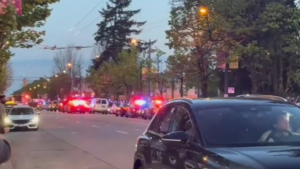The ANC runs the risk of losing next year’s elections if it does not solve the country’s energy crisis in the next 15 months, the newly elected deputy chairperson of its economic transformation committee, Zuko Godlimpi, has conceded.
Godlimpi, the youngest member of the ruling party’s national executive committee (NEC), said there was a much bigger catastrophe looming if the ANC-led government did not succeed in resolving the electricity crisis.
He warned that load-shedding could push the country into upheaval, given the chronic unemployment problem, low growth and the dynamic of an urban-concentrated economy that forces people to migrate to a few cities, putting pressure on public services.
“But in that framework as well, it means that the ANC will lose credibility as it is already bleeding credibility now, if it can’t present itself as capable of ending the load-shedding. So yes, we might lose elections, just at the back of that I think if we solve load-shedding this year, we stand a greater chance of winning elections next year,” he said.
Godlimpi warned that even though current polls showed the ANC winning 48% of the vote next year with Cyril Ramaphosa as president, that figure was not guaranteed if the governing party could not resolve the electricity crunch.
Godlimpi warned that even though current polls showed the ANC winning 48% of the vote next year with Cyril Ramaphosa as president, that figure was not guaranteed if the governing party could not resolve the electricity crunch.
(Reuters/Siphiwe Sibeko)
“Without tackling the energy problem, we will have difficulty justifying why we must be returned into office next year,” he said.
The government has been racing against time to implement its energy action plan as the country’s economy continues to take a knock. Ramaphosa recently appointed an electricity minister whose mandate is to significantly reduce the severity and frequency of load-shedding as a matter of urgency.
Kgosientsho Ramokgopa will oversee the electricity crisis response, with the political responsibility, authority and control over all critical aspects of the energy action plan.
Godlimpi said the Eskom problem remained one of the key macro risks to the country and that the government should consider possible implications that could lead to mass upheaval.
(Waldo Swiegers/Bloomberg via Getty Images)
“We have to get it right in order to avert a much bigger catastrophe than losing an election. That is a subjective concern that supposedly the ANC must be worried about, but it [elections] ranks lower than a social implosion.”
Godlimpi said that part of the debate in the NEC was the alignment on the messaging about Eskom. The party’s highest decision-making structure agreed that Ramaphosa must be the principle communicator on the energy problem, he said, adding that the ANC recognised it needed to improve communication about the crisis.
The ANC regional general council meetings that took place across the country had also looked at the party’s communication on the energy problem, he said, adding: “We need the government to basically clear up communications machinery to be consistent, repetitive, so that all South Africans can have a good sense of how long this thing will take.”
Godlimpi said the ANC lekgotla had resolved to ensure Eskom’s recovery within 15 months.
“But we are operating at just below 25 000 megawatts at any given moment. So that’s 50% of our operational capacity. If we can get about four six of these power stations to operate optimally, we would find ourselves with 32 000 megawatts of energy at any given moment, or at least at peak demand in winter, which means we’ll have better load-shedding just off of that by fixing the existing generation and that is what we are focusing on,” he said.
“There is an engineering sequencing that could help us to beat load-shedding and that is related to getting the number of power stations to be functioning optimally. That must be the single minded strategy that the Eskom leadership focuses on. And that is what the government must insist on with Eskom — that this is your priority from a policy point of view. Our policy priority now is fixing the existing generation capacity will defer all other policy matters to the long term.”
This means Ramaphosa’s plan to unbundle Eskom into generation, transmission and distribution units remains on the back burner for now. Ramaphosa announced the plan in 2019, promising that it would have been executed by December 2022. Eskom however remains a single entity.
Godlimpi said the government had veered off on this plan because the main priority was to grapple with load-shedding. “To fix the energy generation problems, that is our singular focal point for now.”
The ANC had asked the government to prioritise stabilising the grid, he said.
“That is our singular, most urgent thing to be done. So we are not in a position to answer both timelines concerning business modelling. And we would want everyone to be hands-on-deck on just trying to deal with that. Even if it means they must defer their timelines on the other issues.”
Last month, former Eskom chief executive André de Ruyter was quoted as saying unbundling Eskom was a “well-trodden” path and should not be taking this long to execute. Eyewitness News reported that De Ruyter had said Eskom had done everything possible to conclude the unbundling process.
“We have concluded an asset transfer agreement. We have set up the National Transmission Company of South Africa (Ltd). We have set up separate balance sheets, income statements … so we’ve done everything in our power to enable the legal separation of our transmission business,” De Ruyter said.





